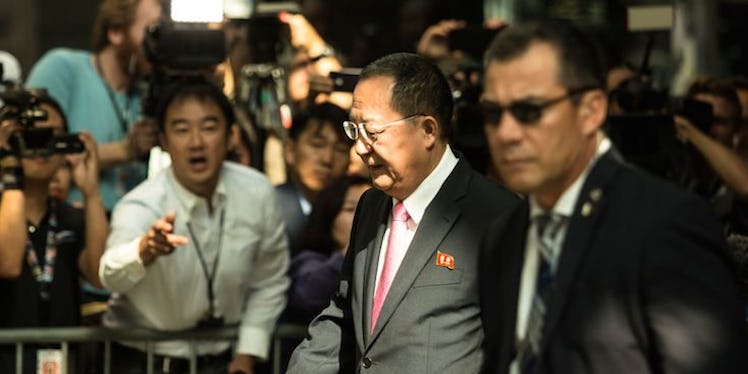
North Korea Calls Donald Trump’s Tweets A “Declaration Of War,” And This Isn’t Good
On Monday, the tension between North Korea and the U.S. ratcheted up one more notch. The country's Foreign Minister Ri Yong-ho said Trump's tweets about North Korea constituted a declaration of war on Sept. 25, referring to remarks that President Donald Trump made last week about North Korea and its leadership, per The New York Times. Now, Ri's warning to the U.S. has experts worried.
Speaking Monday in New York across the street from the United Nations, Ri said,
Last weekend, Trump claimed that our leadership wouldn't be around much longer, and hence, at last, he declared war on our country... Given the fact that this comes from someone that is currently holding the seat of the United States presidency, this is clearly a declaration of war. Since the United States declared war on our country, we will have every right to make countermeasures, including the right to shoot down United States strategic bombers even when they are not inside the airspace border of our country.
The remarks by North Korea are in response to various threats and cheap shots Trump has taken, both on social media and in person, against the country and its leadership. Relations have grown increasingly hostile and condescending over the last month after Trump's "fire and fury" threats on Aug. 8, and coming to a head with a contentious United Nations speech on Sept. 19.
Col. Robert Manning, a spokesperson for the Pentagon, responded to Ri's statement on Monday. According to NPR, he said,
If North Korea does not stop their provocative actions, you know, we will make sure that we provide options to the president to deal with North Korea.
Ri's warning is widely seen as the latest escalation between the two countries' threat-filled exchanges. In fact, North Korea's leader Kim Jong-un already called Trump's words a "declaration of war," but today's remarks by Ri come as a specific and clear warning about the potential consequences of those words. In a statement shared on Sept. 22, Kim said,
Now that Trump has denied the existence of and insulted me and my country in front of the eyes of the world and made the most ferocious declaration of a war in history that he would destroy the D.P.R.K. [Democratic People's Republic of Korea], we will consider with seriousness exercising of a corresponding, highest level of hard-line countermeasure in history.
Beginning with an aggressive speech at the U.N. on Sept. 19, the president publicly dragged his drama into the international spotlight. In his remarks, he threatened to "totally destroy" North Korea.
And over the weekend, the president continued his North Korean feud online.
This tweet came just hours after he'd called the North Korean leader Kim Jong Un a "madman," also via Twitter.
On Saturday, Sept. 23, USA Today reports, the U.S. sent military fighter jets and bombers to international airspace near North Korea, rendering them farther north of the neutral Demilitarized Zone between North and South Korea than they'd ever flown.
While not an act of war, these flights are generally seen as a deterrent rather than a provocation, Vox reports. Still, experts on nuclear war are worried about Monday's comments. While a full-on exchange of missiles remains unlikely (and as the Times notes, North Korea has limited ability to follow through with threats to shoot down U.S. planes), the dynamics and attempts at mutual provocation are troubling.
According to the U.S. House of Representatives Archives, Congress has declared war 11 times since 1789, the last time being World War II. But the president also wields power to embroil the country in international fights, and the U.S. has ended up in conflict with or without formal authorization from the legislative branch to enact war. As you probably noticed, we've been engaged in "war" without calling it that for the past couple of decades in multiple countries, such as Iraq and Afghanistan.
Jeffrey Lewis, an expert on North Korea, explained to Vox that possessing nuclear power can give some world leaders a cockiness they wouldn't normally have -- akin to being reckless when drivers know they have seat belts to protect them.
There is some research about seat belts — early on, it seems, drivers with seat belts drove more aggressively. Nuclear weapons, for some leaders, do the same thing.
Hopefully the metaphor ends here and the world doesn't end up with two overly confident drivers who crash while wearing seat belts. There's an awful lot of passengers involved.